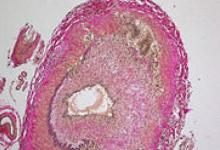Biologics in Psoriasis Tied to Better Heart Health Save

Biologic therapy for severe psoriasis was associated with better plaque morphology and less non-calcified coronary plaque, according to a prospective, observational study.
Biologic therapy was linked with a 6% decrease in non-calcified plaque burden (P=0.005) and a significant reduction in necrotic core versus no biologic therapy, but with no difference in fibrous burden, reported Nehal Mehta, MD, of the National Heart, Lung, and Blood Institute in Bethesda, Maryland, and colleagues in Cardiovascular Research.
The decline in non-calcified plaque burden among the biologic treatment cohort was linked with biologic therapy beyond adjustment for the usual cardiovascular risk factors (ß=0.20, P=0.02). Moreover, this decrease in non-calcified plaque burden among the biologic therapy cohort was significant in comparison with slow plaque progression in the non-biologic therapy cohort (Δ -0.07 mm2 vs 0.06 mm2, P=0.02), they found.
Severe psoriasis is linked with early MI risk exceeding 50%, with rates of coronary artery disease being like those of type 2 diabetes. The inflammation behind psoriatic skin harbors cytokines important to plaque rupture and early atherogenesis, with derangements in pro-atherogenic and pro-inflammatory cytokines like tumour necrosis factor-α (TNF-α), interleukin-1ß (IL-1ß), and interleukin-17 (IL-17), the researchers highlighted.
Biologic therapy is generally used to treat severe psoriasis, the investigators noted. "This provides a reliable model to study inflammatory atherogenesis and the longitudinal impact of modulating specific cytokines on vascular behaviour, while treating the primary skin disease with FDA approved biologic therapies," Mehta's group wrote.
In a recent investigation of patients with high residual inflammatory risk, or a high sensitivity C-reactive protein >2 mg/L, and MI, canakinumab (Ilaris), a monoclonal antibody aimed at IL-1, led to a decline in the rate of non-fatal stroke, non-fatal MI, and cardiovascular death not related to cholesterol levels.
The results from that investigation supported the need to enlarge clinicians' understanding of the possible effects of biologic treatment on coronary vasculature, Mehta's group noted.
The present investigation underscores "the importance of discussing heightened cardiovascular risk in psoriasis, and to consider treating severe disease given that we have shown it halts progression and may even improve high risk coronary plaque," Mehta told MedPage Today.
Mehta's group gathered information on 121 patients, with a mean age of 50.4, from the NIH Psoriasis Atherosclerosis Cardiometabolic Initiative cohort. At baseline, participants were biologic treatment naive, but 89 were randomized to the biologic treatment group receiving either anti-TNF, anti-IL12/23, or anti-IL17, while 32 were randomized to the non-biologic treatment group.
Participants were 58% male, had moderate-to-severe skin disease (median Psoriasis Area and Severity Index or PASI score 8.6), and had low cardiovascular risk (median Framingham score, 3).
At baseline, patients underwent coronary CT angiography (CCTA). A year later, CCTA was done again to determine the characteristics and amount of plaques. Coronary artery plaque indices were assessed by CCTA to understand modulation on cardiovascular disease risk, the authors explained.
The observational study had limitations including consecutive enrollment, the open-label use of biologic agents, and a small sample size with a short follow-up.
This study was supported by the National Heart, Lung, and Blood Institute (NHLBI), the Intramural Research Program, the NIH Medical Research Scholars Program, the Doris Duke Charitable Foundation, the American Association for Dental Research, the Colgate-Palmolive Company, Genentech, Elsevier, and other private donors.
Mehta disclosed support from NHLBI, AbbVie, Janssen, Celgene, and Novartis. Co-authors disclosed multiple relevant relationships with industry.










If you are a health practitioner, you may Login/Register to comment.
Due to the nature of these comment forums, only health practitioners are allowed to comment at this time.